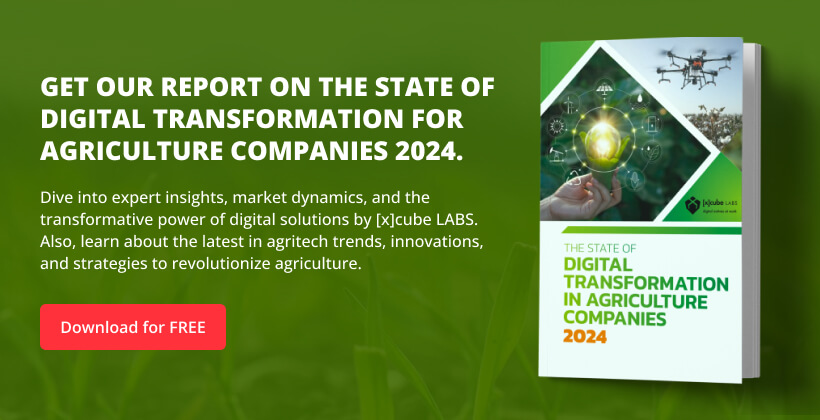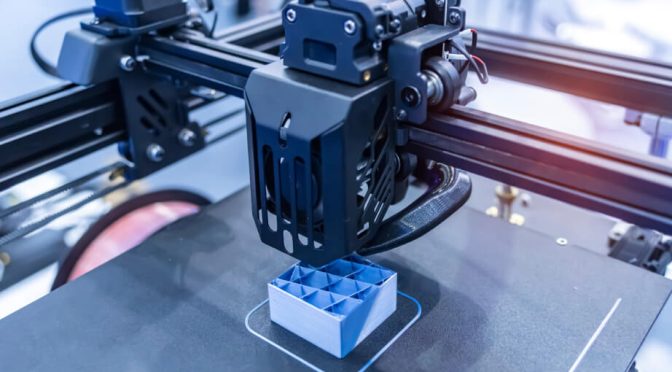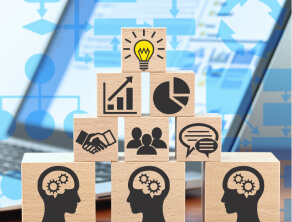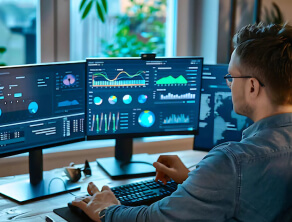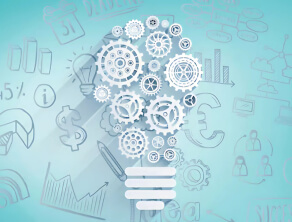How AI is Transforming the Agriculture Industry
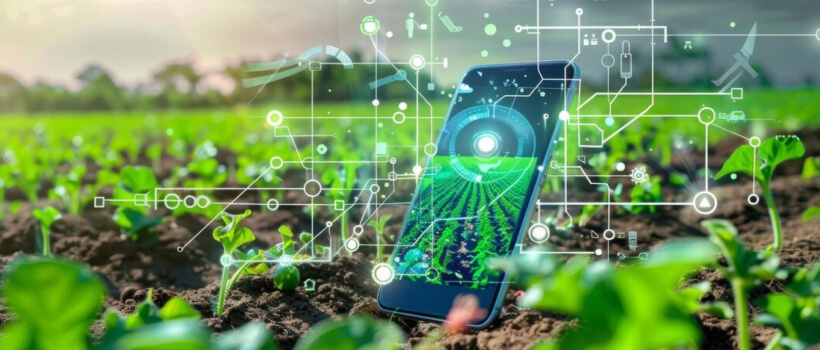
Agriculture, the backbone of civilization, is undergoing a revolution driven by artificial intelligence (AI). This powerful technology transforms how we grow our food, promising a future of increased yields, resource efficiency, and sustainable practices. Let’s explore how AI is sowing the seeds of change in agriculture.
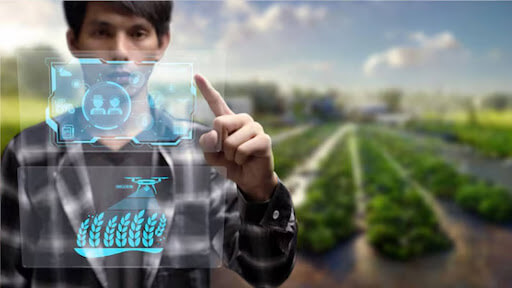
From Data to Decisions: The Power of Precision
AI excels at analyzing vast amounts of data. In agriculture, this translates to harnessing information from field sensors, drones capturing aerial imagery, and historical weather patterns. AI algorithms can identify patterns and trends, enabling farmers to make data-driven decisions.
For instance, AI can analyze soil conditions to determine precise fertilizer needs, optimize resource use, and minimize environmental impact. Similarly, AI-powered disease and pest detection can pinpoint problem areas within a field, allowing for targeted treatment, reducing waste, and safeguarding crops.
Enhancing Crop Management
AI-driven systems can track crop growth stages, monitor plant health, and predict yield outcomes. AI can provide real-time insights into crop performance by integrating data from various sources, such as satellite imagery and ground-based sensors. This allows farmers to adjust their strategies promptly, ensuring optimal growth conditions and maximizing productivity.
Optimizing Resources for a Sustainable Future
Water scarcity is a growing concern. AI is crucial in optimizing irrigation by analyzing real-time data on soil moisture and weather conditions. This ensures crops receive the precise amount of water they need, reducing waste and promoting sustainable water management.
Precision Agriculture
AI can also help optimize fertilizer applications in precision agriculture. By analyzing soil composition and crop health, AI can determine the exact fertilizer needs for different zones within a field. This targeted approach reduces excess fertilizer use, minimizes environmental pollution, and promotes sustainable practices.
Predicting the Future: A Farmer’s Best Friend
AI’s ability to analyze historical data and weather patterns allows it to predict future trends. This empowers farmers to make informed decisions about planting dates, crop selection, and resource allocation. AI can also predict potential disease outbreaks or pest infestations, allowing farmers to take preventive measures and minimize crop losses.
Climate Adaptation
As climate change continues to impact agriculture, AI can help farmers adapt to shifting weather patterns. By providing accurate weather forecasts and climate models, AI enables farmers to plan and adjust their practices accordingly, ensuring resilience against climate variability.
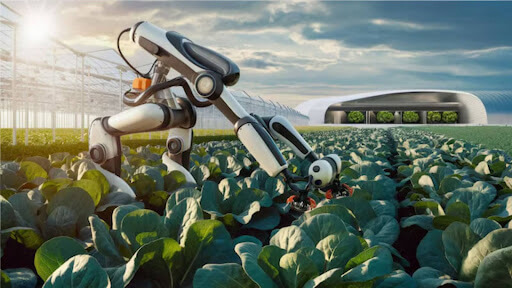
The Rise of the Robot Farmers
While self-driving tractors may still be on the horizon, AI-powered robots are already making their way into agriculture. These robots can perform tedious tasks like weed removal and fruit picking, freeing up farmers’ time and resources for other crucial activities. Additionally, AI-powered drones can map fields, monitor crop health, and even apply pesticides with pinpoint accuracy.
Automation and Labor Efficiency
AI-driven automation reduces the need for manual labor, addressing labor shortages and increasing efficiency. Robotic systems can work around the clock, performing repetitive tasks precisely and consistently, ultimately boosting farm productivity.
Innovations in Pest Detection and Crop Health Monitoring
AI empowers sustainable farming with precise pest detection and crop health monitoring. By analyzing subtle signs in satellite imagery, AI can identify threats before visible damage, enabling targeted treatments to minimize pesticide use and environmental impact. This fosters a safer and healthier future for agriculture.
Early Warning Systems
AI-driven early warning systems can alert farmers to potential risks, such as pest invasions or disease outbreaks before they escalate. This proactive approach enables timely interventions, safeguarding crops and reducing reliance on chemical treatments.
The Future of Farming is Intelligent
The integration of AI in agriculture is still in its early stages, but the potential is vast. As AI technology evolves, we can expect even more transformative applications, such as robots capable of delicate tasks like harvesting fruits and vegetables and AI-powered systems that can optimize entire farm operations.
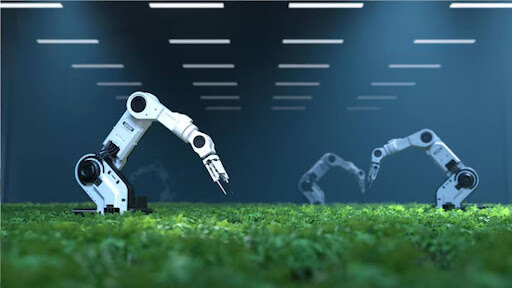
Continuous Innovation
Ongoing research and development in AI are expected to bring forth innovative solutions that address the complex challenges faced by modern agriculture. From enhancing food security to promoting sustainable practices, AI promises to revolutionize how we produce food and manage agricultural resources.
In conclusion, AI is not just transforming agriculture; it is revolutionizing it. By enabling precision, optimizing resources, predicting future trends, automating tasks, and innovating pest detection, AI is setting the stage for a more efficient, sustainable, and resilient agricultural industry. The future of farming is intelligent, and the possibilities are boundless.
How can [x]cube LABS Help?
[x]cube LABS’s teams of product owners and experts have worked with global brands such as Panini, Mann+Hummel, tradeMONSTER, and others to deliver over 950 successful digital products, resulting in the creation of new digital revenue lines and entirely new businesses. With over 30 global product design and development awards, [x]cube LABS has established itself among global enterprises’ top digital transformation partners.
Why work with [x]cube LABS?
- Founder-led engineering teams:
Our co-founders and tech architects are deeply involved in projects and are unafraid to get their hands dirty.
- Deep technical leadership:
Our tech leaders have spent decades solving complex technical problems. Having them on your project is like instantly plugging into thousands of person-hours of real-life experience.
- Stringent induction and training:
We are obsessed with crafting top-quality products. We hire only the best hands-on talent. We train them like Navy Seals to meet our standards of software craftsmanship.
- Next-gen processes and tools:
Eye on the puck. We constantly research and stay up-to-speed with the best technology has to offer.
- DevOps excellence:
Our CI/CD tools ensure strict quality checks to ensure the code in your project is top-notch.
Contact us to discuss your digital innovation plans, and our experts would be happy to schedule a free consultation.
Appendix:
- https://www.mdpi.com/2223-7747/13/5/653
- https://www.sciencedirect.com/science/article/pii/S2666154323002831#:~:text=IoT%2Dbased%20smart%20sensors%20can,camera%20coupled%20with%20GPRS%20system.
- https://harveyenviro.co.uk/embracing-digital-innovation-in-pest-control-the-power-of-sensor-technology-and-ai/
![Blog-[x]cube LABS](https://d6fiz9tmzg8gn.cloudfront.net/wp-content/uploads/2016/06/blog_banner.jpg)
